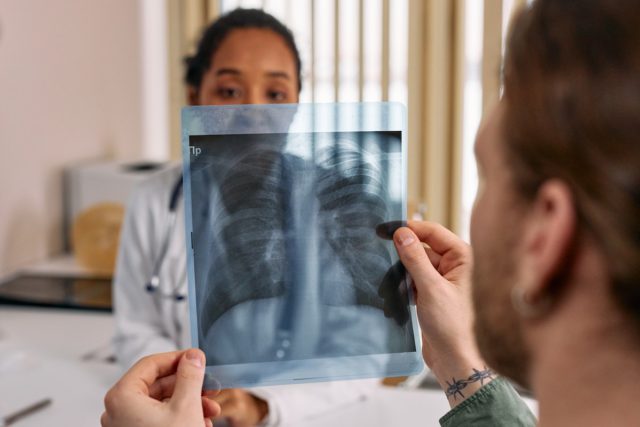Patient education is an effective tool in helping patients take a more active role in their health. Providing information to patients about their treatment plans and expectations can be an effective way to ensure better outcomes. Education also helps provide reminders for appointments, visits and medications which can improve patient compliance and adherence to the plan of care.
It can also help to explain what preventive health measures they should be taking and how they can better manage their chronic illnesses. Nurses and other healthcare providers can use education to share information about medications, lifestyle modifications, diet, and exercise. All of this helps the patient understand their treatment plan more clearly which in turn enhances their satisfaction with care and increases the likelihood of successful health outcomes. Giving patients education improves adherence to medication regimens, increases preventive behaviors associated with healthier lifestyles, strengthens communication between patients and healthcare professionals through secure messaging technology, and ultimately leads to better overall health outcomes.
Patient training is an integral part of patient care and helps to ensure that patients receive the most effective treatment possible. Patient education brochures can help patients understand their treatments and available health services, recognize abnormal symptoms, prevent negative outcomes, and improve their overall care quality. Nurses play a key role in patient education by providing timely information about the diagnosis, treatment regimens, and prevention strategies. Educating patients also empowers them to take an active role in their healthcare decisions and ongoing patient management.
Patient education can greatly improve healthcare outcomes by providing patients with the medical information they need to make informed decisions and better understand their health condition. Education software can be used to provide comprehensive educational material that is tailored to a patient’s individual needs. This helps ensure that treatment plans are properly understood and followed more closely, resulting in a higher level of compliant patients. Additionally, providing education can help those with certain chronic diseases avoid unnecessary trips and treatments. By giving patients better education about their health condition and its associated treatments, healthcare providers are able to improve outcomes for those living with chronic disease.
Patient education helps patients understand and manage their care, including surgical procedures, medications, proper ways to handle recovery, and other necessary treatments. The result is that patients are more likely to adhere to treatment plans and less likely to experience nonessential readmissions. This can have a significant positive effect on patient health outcomes as well as the financial burden of care for the providers.
Educating patients about their health and providing them with clinical decision support tools like VisualDx can help to empower them to take a more active role in managing their own health. Providing educational materials and support tools can help patients understand and manage aspects of their physical well-being, helping them to make better decisions that will improve both short-term and long-term outcomes.
Patient education pamphlets aim to provide patients with the necessary information and resources to make informed decisions about their health. This includes providing patient engagement opportunities, making available treatment plans and educational packages, and understanding mental health issues and other health initiatives. Prevention guidelines should be part of the education package, as well as information relevant to side effects from treatments or medications. Reference materials should also be made available for further research on topics that may interest the patient. Giving patients access to this type of educational material helps them become more engaged in their own care, which improves prevention efforts and better management of symptoms when they arise. By giving patients access to reliable sources of information, they can better understand their condition and know what options are available for treatment and management.

Patient education is a key component of the patient journey and can have significant implications for improved health outcomes, patient satisfaction and care costs. Healthcare providers, medical device manufacturers and other stakeholders have a positive relationship with patient education as it improves health outcomes. Patients who are educated on the risks and benefits of their treatment plan are more likely to adhere to their prescribed treatments, resulting in better long-term health outcomes. This leads to reduced care costs for both patients and healthcare providers. In addition, patient education can help build trust between patients and healthcare providers as it encourages active participation in their own treatment journey.
Patients who are more engaged in their care can build better relationships with their physicians and make informed medical choices. This, in turn, can lead to improved health outcomes for the patient. Patient education is becoming increasingly important in the healthcare industry as it helps to prevent chronic diseases and improve the overall health of individuals. Energy educating patients about prevention can help reduce health costs for insurance companies and communities by decreasing hospital visits due to preventable chronic diseases. It also helps to save resources for healthcare providers by providing information that patients need regarding disease management strategies or lifestyle changes that may be necessary. The educational process should be tailored to each individual patient so they can understand the content provided, while at the same time having hearty engagement with their physician which will help ensure they understand what needs to be done on an individual basis.
Healthcare professionals should be able to use systems that allow patients to access educational materials at any given time. This way clinicians can provide notes that are tailored specifically for the patient, as well as care plans and other necessary information. A modern education system is the best way for healthcare professionals to provide educational materials in a quick and efficient manner. This allows them to keep up with the newest education systems in order to give their patients full control of their health information so they can make educated decisions about their symptoms. By teaching patients how to handle emergencies, manage chronic illnesses, and make lifestyle changes, healthcare providers can ensure their patients are better equipped to take care of themselves.





WORKOUTS
Healthy Mind
How Pets Boost Emotional Well-being
Healthy Mind
Pursuing Excellence in Healthcare
Healthy Mind
Importance of Patient Safety Awareness
Healthy Mind
Steps to Achieve a Healthier Lifestyle
Healthy Mind
Dos and Don’ts of Gardening
Healthy Mind
A Journey To Inner Beauty
Healthy Mind
Why Do I Need A Bicycle Bag